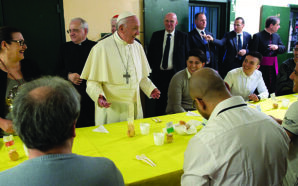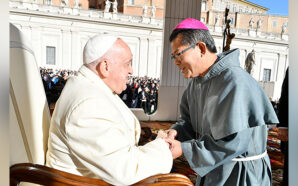There’s more infighting on #CatholicSocialMedia than in a medieval royal family. They fight about the best version of Catholicism: those faithful to the Pope or those who decry the Holy Father as a heretic, those who believe their theology is right and everyone who disagrees with them.
Catholic social media can be an inhospitable space, especially Twitter, YouTube and Facebook. It’s a great place to make the lonely feel lonelier and the stranger feel stranger.
St. Benedict’s Rule, a sixth-century guide for monks living in community, instructed monks to receive all guests as Christ. It’s an instruction founded on Christ’s words to welcome the stranger: “I was a stranger and you took me in” (Mathew 25:35).
Hospitality followed the welcome in the form of prayer, dialogue, and invitation into the monastery. Most of us are not Benedictines. We have made no vows of extreme hospitality as expressed in Benedict’s Rule. Still, we can, at minimum, follow Christ’s teaching in welcoming the stranger.
Christ placed no limits on when, where, or how to welcome and be hospitable to the stranger. Accordingly, hospitality applies not only to our homes but also to public and perhaps, virtual spaces.
Therefore, Christian hospitality extends even to our social media feeds.
Yet, a cohort of well known Catholic media influencers, who actively blog, vlog, and podcast, struggle with applying the basic tenants of Christian hospitality online. A few of these Catholic influencers may even be household names.
A brief look at any of their social media feeds finds people whose “hospitality” regularly relishes in personal attacks, mockery and a distinct “us v. them” rhetoric. The thought of allowing the stranger to sit and dialogue is absent.
Generally, hospitality is in three parts: an encounter, a dialogue, and an invitation. Each part naturally leads into the other in that order.
Christian hospitality is different from our non-Christian friends’ hospitality. Christian hospitality is animated by the Divine love with the assumption that the welcomed stranger is Christ. When done right, Christian hospitality leads others to Christ.
The influencers mentioned above often don’t progress beyond the encounter and regularly shut down dialogue. Fuelled by a need to be correct, create clickbait and build followers, the theoretical invitation to follow Christ becomes an invitation to follow them.
Christians acting inhospitable in virtual spaces is like an anti-gospel. Where hospitality lightens the load of a weary stranger, inhospitality rejects and frustrates the stranger.
Inhospitably coats God’s Word in pride, self righteousness and indifference.
Social media could be different. What if Catholics were the leaven not only in the real world but also in the virtual world? There is a way to express points of difference, even when anonymously hidden behind a cartoon avatar on a computer screen. The Commandment to “Love Thy Neighbour” did not have a caveat “except when commenting online.” After all, if Saint Paul were writing today he could have just as easily written, do not neglect to show hospitality to strangers online, for thereby some have entertained angels unaware.
Paul Catalanotto, is a former school teacher who, after 14 years of teaching, recently moved to Australia in March, got married during a pandemic and returned to university to research human dignity in the writings of John Paul II and Pope Benedict XVI. He has walked the Camino de Santiago twice, climbed the Breithorn in the Alps, and slept under the stars in many locations in the southern United States.
By Paul Catalanotto. Reproduced with permission from The Catholic Weekly, the news publication of the Catholic Archdiocese of Sydney.








